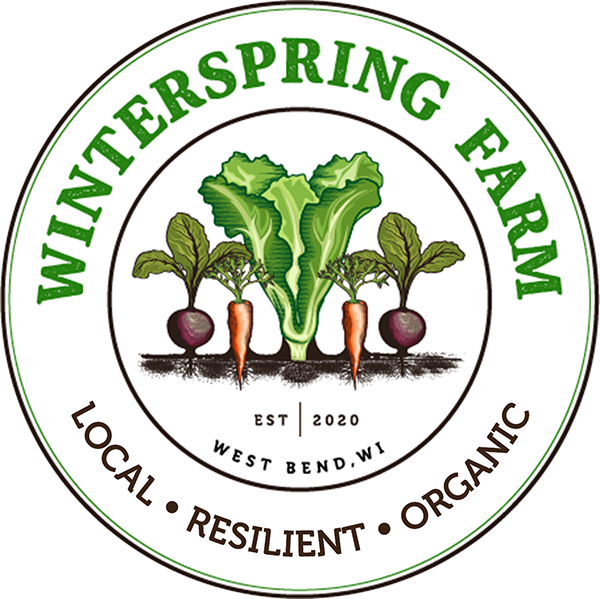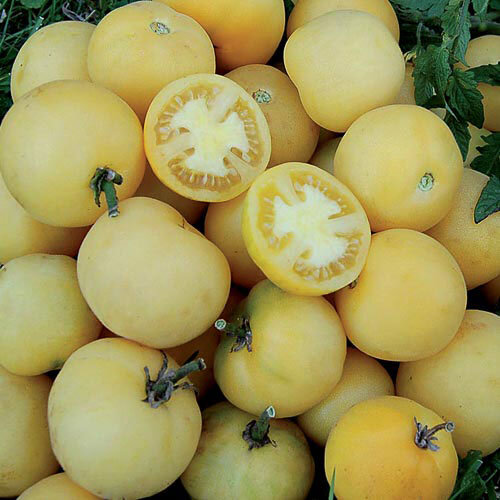 Image 1 of
Image 1 of


Tomato Seedlings, Green Zebra
SCIENTIFIC NAME:
Solanum lycopersicum
VARIETIES:
"Green Zebra". Green-striped salad specialty. A delicious, tangy salad tomato, ripe just as the green fruit develops a yellow blush, accentuating the darker green stripes. The 3–4 oz. fruits are the ideal size for slicing into wedges for salads. Productive over a long season. Indeterminate. Seed source and photo: High Mowing Seeds
CULTURE:
Transplant into medium-rich garden or field soil 12-24" apart for determinate varieties, 24-36" apart for indeterminate, unstaked varieties, and 14-20" for staking. Plant 3-8" inches deep, covering the root ball well and up to the cotyledons (first leaves). If using grafted plants, take care to ensure the graft union is not touching soil. Water seedlings with a high-phosphate fertilizer solution. For earliest crops, set plants out around the last frost date under floating row covers, which will protect from frost to about 28°F (-2°C). If possible, avoid setting out unprotected plants until night temperatures are over 45°F (7°C). Frost will cause severe damage. Abundant soil phosphorus is important for early high yields. Too much nitrogen causes rampant growth and soft fruits susceptible to rot.
SCIENTIFIC NAME:
Solanum lycopersicum
VARIETIES:
"Green Zebra". Green-striped salad specialty. A delicious, tangy salad tomato, ripe just as the green fruit develops a yellow blush, accentuating the darker green stripes. The 3–4 oz. fruits are the ideal size for slicing into wedges for salads. Productive over a long season. Indeterminate. Seed source and photo: High Mowing Seeds
CULTURE:
Transplant into medium-rich garden or field soil 12-24" apart for determinate varieties, 24-36" apart for indeterminate, unstaked varieties, and 14-20" for staking. Plant 3-8" inches deep, covering the root ball well and up to the cotyledons (first leaves). If using grafted plants, take care to ensure the graft union is not touching soil. Water seedlings with a high-phosphate fertilizer solution. For earliest crops, set plants out around the last frost date under floating row covers, which will protect from frost to about 28°F (-2°C). If possible, avoid setting out unprotected plants until night temperatures are over 45°F (7°C). Frost will cause severe damage. Abundant soil phosphorus is important for early high yields. Too much nitrogen causes rampant growth and soft fruits susceptible to rot.
SCIENTIFIC NAME:
Solanum lycopersicum
VARIETIES:
"Green Zebra". Green-striped salad specialty. A delicious, tangy salad tomato, ripe just as the green fruit develops a yellow blush, accentuating the darker green stripes. The 3–4 oz. fruits are the ideal size for slicing into wedges for salads. Productive over a long season. Indeterminate. Seed source and photo: High Mowing Seeds
CULTURE:
Transplant into medium-rich garden or field soil 12-24" apart for determinate varieties, 24-36" apart for indeterminate, unstaked varieties, and 14-20" for staking. Plant 3-8" inches deep, covering the root ball well and up to the cotyledons (first leaves). If using grafted plants, take care to ensure the graft union is not touching soil. Water seedlings with a high-phosphate fertilizer solution. For earliest crops, set plants out around the last frost date under floating row covers, which will protect from frost to about 28°F (-2°C). If possible, avoid setting out unprotected plants until night temperatures are over 45°F (7°C). Frost will cause severe damage. Abundant soil phosphorus is important for early high yields. Too much nitrogen causes rampant growth and soft fruits susceptible to rot.





